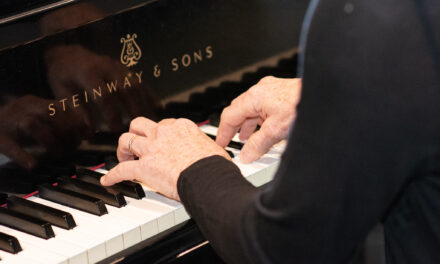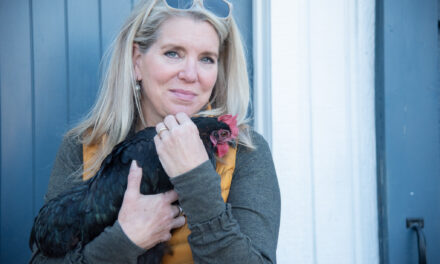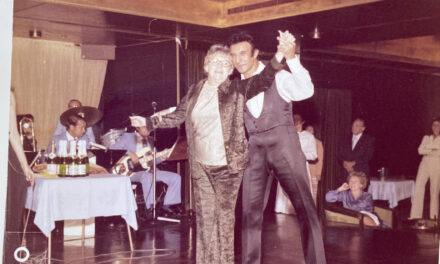Time and privacy was what we had and what we do not have any more. No Facebook to tell the world about ourselves. No desire to tell the world. We told our stories to the people to whom we were close.
It was suggested I comment on the changes I had seen in my life over what is almost one hundred years. Do I think that things have actually changed in my world, in my behavior, my style, my ethics, my values and rules to live by? Have I changed with the changes that have happened?
The answer is a resounding YES.
Communication:
I had my first telephone, my own with my own number, when I was twenty-one, after I graduated from college. My great grandson at five years old, can tell Alexa to start the vacuum cleaner. I put money in the slots provided and made a call from a public telephone booth when I was in my teens. I used it seldom.
Transportation:
My mother drove a Fiat convertible to go to work. I was conveyed in the rumble seat on the outside of the car. Communication was not possible with the driver. I stayed home when she went to work as medical intern. My father worked in the same hospital, also an intern. They had met as students in medical school.
However, the police intervened. It was against the law to leave a baby in the rumble seat, unattended. It was not allowed to leave the baby on the balcony unattended either even though my mother came home in that same little car, every four hours to nurse me, the baby. There were no refrigerators for pumped breast milk. Three years later there were two babies, a housekeeper who mothered us and a mother and father who left us.
In this regard, nothing has changed. Mothers still nurse babies but now they can store, at their leisure, the pumped breastmilk in the refrigerator, the bottle can be given by anyone, and the baby can be stored in a room provided at the place of work and, of course, parents are still splitting up.
When we emigrated, after Hitler took power and after the parents’ divorce, we went from Germany to England by boat across the Channel, by train to London, by bus to our new boarding school. That school also had moved, from Germany to Kent, England near the white cliffs of Dover, to shelter and educate Jewish refugee children. We had no telephones, of course we never talked to our father or to our mother who had stayed in Berlin. I was nine years old; my brother was six.
We wrote letters: Dear Mutti, we are fine. We had a picnic last week. I love you. Dear Papi, with similar news items. He came to visit us once a month from London. A two-hour bus trip. I was able to show him how well I rode my bike, but I had to confess that I had fallen and that I had a large new scar on my knee. I wanted him to be proud of me.
From that time on until I was in my last year at college in New England, I wrote airmail sheets that required no stamps, bought pre-stamped at the post office. I had been elected to Phi Beta Kappa and that was so unbelievable a fact to me that I went out and called my father in London to tell him the news. It was also so expensive I could not bear to talk for more than the three minutes which I had paid.
Later, when I married, we did have a telephone but hardly ever used it for long distance calls. Letters were handwritten and put in an envelope with a three-cent stamp. Postcards cost a penny. Travel in England was by bus or train or car for those who had cars. We did not.
Daily Life:
We also did not have a refrigerator but rather a small box outside our kitchen window which was screened and where butter and milk were stored. Later after I had immigrated to this country, and worked in New York, I had an ice box which was supplied by the ice man who carried a large square block of ice and put it in the top part of the icebox once a week where it slowly dripped into a pan needing to be emptied every day so as not to cause a flood to the woman living below.
Back in London, we heated food bought in cans and we put the can in the water in the pot so that we did not have to dirty the pot and have to wash it. Microwaves were far into the future.
In my father’s flat as in our boarding school, there were no showers only baths. At school we were bathed once a week. We washed daily in a sink in our room and washed from top to bottom with soap and a washcloth.
I write this on my little laptop. I had learned to type when I took a course in typing on a typewriter, in high school in Los Angeles. More, many more years later (I was fifty years old by then), I bought myself an electric typewriter to write my master’s thesis. From there it was another twenty years before I had my first Apple computer on which I wrote my own story. The computer was a life changer. All of us professionals lost our secretaries. Almost as terrible as losing a parent.
So Many Changes:
It changed all our lives – private and professional, made everything easier and faster but some things suffered and are only now replaced. I’m thinking of delivery: mail came three times a day. My groceries came daily after my telephone call to our grocer who offered me a “nice” chicken, fresh fruit just delivered, fresh vegetables, even alcohol and general supplies came once a week activated only by my phone call. We tipped the system at Christmas. The price of the groceries included their delivery.
The doctor came to the house. We did not bring sick children (nor ourselves) to the office. That was true in my childhood and in the time of my children’s childhoods.
I have not even mentioned airplanes. I traveled as passenger in a car when I left home to go to college from Los Angeles to Northampton, MA. Mainly I traveled by train and boat. Crossed the Atlantic I think twenty-five times, and most of those by boat before flying became less expensive. We had time to set the clock slowly, one hour a day. We got used to being away from home and friends, spoke the new language or learned a new one to get used to life in France or Germany and even Italy. Tried to learn the names of the states in the U.S. when I came to this country and match them with their capitals and try to spell and pronounce Illinois, Mississippi.
Privacy:
Time and privacy was what we had and what we do not have any more. No Facebook to tell the world about ourselves. No desire to tell the world. We told our stories to the people to whom we were close. Time is what was taken for granted. Time to learn, to love, to understand, to make and keep friendships, to cook and eat elaborate meals, to listen and to talk and to travel and to absorb the experiences. To go to the market and choose your produce.
Alexa reads to me now at lunch and at dinner. Sixty and seventy years ago, I read out loud to our children while they ate their meals. We sat around and talked endlessly. We had no ready phones, we could not be interrupted or called for any reason whatsoever. It was not a loss. It gave us privacy and leisure. We also got to know one another because we did talk at dinner and at lunch and for tea and drinks and coffee. In the car we talked or played games because we did not have an electronic toy.
Today:
There is no point in going on with this enumeration of what things were like then. I am trying to see if we have lost or if we have gained or if it is irrelevant since this is what happened, and it is called progress. Times change. Must we take more than the memory with us? Should we simply enjoy what has helped and notice perhaps what we might be sad to have lost? Will today’s children have different values, visit different planets, chose as yet undiscovered pleasures?
Surely sexual behavior will be and is already different, health and healing are different. Diseases are different. Teeth are beautiful, white and straight. Contact lenses. Help for the ill and the poor and the displaced is as wanting as ever. The victims of weather, floods and fires are still at the mercy of those powers. Immigration and emigration must be made less painful – nothing has improved on that front. The destruction from war and all other forms of violence and strife are worse and more numerous.
There is a lot that needs to be done. We have come a long way in my almost hundred years and there are the good things and there are the not so good things. Change is always happening. It needs to be watched and guided by an informed, concerned, caring, and educated people.
Are they paying attention?
The author, Renée Levine, is, in her words, an old woman and an experienced senior living expert.






